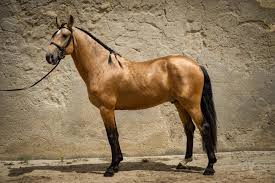
Lusitano
Conditions of detention
Lusitanos thrive in environments where they have access to both stabling and open spaces for exercise. They are accustomed to a Mediterranean climate but can adapt well to different environments as long as they have adequate shelter, space, and care.
Useful Fact: Lusitanos, being used to hot climates, often prefer well-ventilated stables and shaded areas in pastures to avoid overheating.
Nutrition and diet
Lusitanos require a balanced diet of high-quality hay, grains, and necessary supplements to support their muscular build and active lifestyle. Their diet should be adjusted based on their workload, age, and individual needs.
Useful Fact: Lusitanos tend to maintain their weight well, but their diet should be carefully managed to prevent obesity, especially if they are not in regular work.
Health
Lusitanos are generally healthy and robust, with a strong immune system. However, like all horses, they can be prone to specific issues such as metabolic disorders or joint problems, particularly if overworked. Regular veterinary care is essential to ensure they remain in peak condition.
Useful Fact: Lusitanos are known for their longevity and often remain active and healthy well into their late teens and twenties with proper care.
Grooming and care
Regular grooming is essential for Lusitanos to maintain their sleek coats and prevent skin conditions. They have strong hooves that require regular trimming, and their manes and tails should be groomed to avoid tangling.
Useful Fact: Lusitanos, especially those used in performance, often benefit from regular baths and grooming routines to keep their coats in top condition, particularly before competitions.
Education and training
Lusitanos are highly intelligent and respond exceptionally well to training, particularly in disciplines that require precision and finesse, such as dressage and classical riding. They are quick learners and often excel in high-level training when treated with respect and consistency.
Useful Fact: Due to their natural aptitude for collection and agility, Lusitanos are often trained in classical dressage from a young age, where they excel in complex movements like piaffe and passage.
Toys and entertainment
Lusitanos enjoy mental and physical stimulation. Toys that challenge their intelligence, such as puzzle feeders or interactive objects, can keep them entertained. Regular exercise, including varied riding routines, is also essential to keep them mentally and physically fit.
Useful Fact: Incorporating ground work or liberty training into their routine can provide additional mental stimulation and help deepen the bond between the Lusitano and its handler.
Safety
Lusitanos are generally calm and well-behaved, but due to their intelligence and sensitivity, they require a secure, safe environment. Fencing should be solid and well-maintained to prevent accidents, especially in open pastures.
Useful Fact: Lusitanos are known for their strong bond with their handlers, which often makes them easier to manage safely compared to more independent or flighty breeds.
Accessories
Lusitanos, often used in high-performance disciplines, require well-fitted tack to ensure comfort and prevent injury. This includes saddles specifically designed for dressage or classical riding, bridles, and protective leg gear.
Useful Fact: Custom or carefully selected tack is crucial for Lusitanos, especially in competitive settings, to ensure they perform at their best without discomfort.
Socialization
Lusitanos are social horses that thrive on interaction with both humans and other horses. They form strong bonds and enjoy being part of a herd. Regular social interaction is important for their mental well-being.
Useful Fact: Lusitanos are often used in pairs or teams for driving and other activities, which highlights their strong social instincts and ability to work well with others.
Travel and Transportation
Lusitanos generally handle travel well, but as with any horse, they require a comfortable, well-ventilated trailer with enough space to stand securely during transport. Regular stops on long journeys for water and rest are recommended.
Useful Fact: Lusitanos’ calm nature often makes them good travelers, but familiarizing them with the trailer before long trips can help reduce any travel-related stress.
Behavior and psychology
Lusitanos are known for their calm, cooperative nature and strong work ethic. They are sensitive and intelligent, responding well to gentle, consistent training methods. Their natural ability to connect with their rider makes them particularly suited for disciplines that require a close partnership.
Useful Fact: Lusitanos are often described as having a “willing heart,” showing a strong desire to please their handler, which makes them both loyal and reliable partners in any equestrian discipline.
Legal aspects
Owning a Lusitano may involve specific legal considerations, particularly if they are used in breeding or competition. Registration with the Lusitano breed registry (Associação Portuguesa de Criadores do Cavalo Puro Sangue Lusitano – APSL) is necessary for breeding, and compliance with animal welfare and competition regulations is essential.
Useful Fact: The Lusitano’s pedigree and lineage are highly valued, especially in breeding and competition circles, so ensuring proper registration and documentation is important for maintaining the horse’s value and status.


